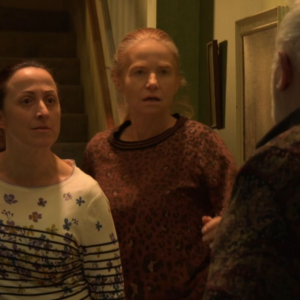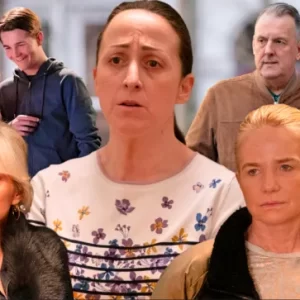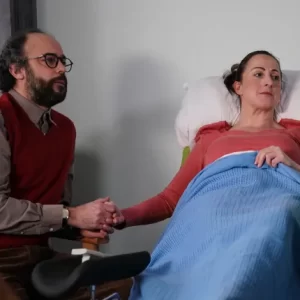Albert Square is bracing for one of its most emotionally devastating chapters yet. At the heart of it all? A friendship tested by illness, fear, and the looming specter of goodbye. This time, there’s no feud or fight to win—just a soul to save. EastEnders plunges viewers into the depths of human fragility as Nigel Bates, the beloved returning face from Walford’s past, reveals the silent war he’s been fighting all along.
When Nigel returned to the Square, fans were thrilled to see his familiar warmth and gentle humor light up the screen again. But beneath that easy smile was a heartbreaking truth—Nigel is battling early onset dementia. Desperate to hold onto pieces of the life he once had, he believed that coming home might help. Maybe the memories etched into the cobbles of Albert Square could anchor the parts of him that were slipping away. But memory is a cruel thing—and comfort, it seems, can only hold off the inevitable for so long.
As Easter weekend arrives, Nigel makes one final attempt to feel needed. He volunteers to play the Easter Bunny at the community egg hunt—a gesture drenched in both charm and tragedy. It’s a symbol of his will to belong, to prove he still matters. But the joy of the day is shattered when he mistakes little Hope for his own daughter, Clare.
The slip is minor—unless you know the truth. But Harvey doesn’t. His reaction is harsh, erupting into a scene that catches everyone off guard. The joy of Easter turns to awkward confusion. Jean and Ian watch closely, their concern growing. And then all eyes turn to Phil Mitchell.
Phil, the man who’s held Nigel’s secret tightly, is now forced to speak the words he’s dreaded. In front of Walford’s watchful eyes, he tells them the truth—Nigel has dementia. For a man who’s built his entire life on control, on hiding his emotions behind a hard exterior, it’s a raw, rare moment of vulnerability. And it changes everything.
But just when viewers think they’ve seen the emotional peak, EastEnders flips the script.
That night, Phil finds a letter tucked away—a note that chills him to his core. It’s from Nigel. A goodbye.
In his own words, Nigel explains that if his memory continues to fade, he plans to take his own life. It’s not an impulsive act. It’s been quietly building inside him, a desperate response to the fear of losing himself completely. And for Phil, it’s the kind of pain he can’t fight with his fists. This isn’t a rival. This isn’t a turf war. This is a friend slipping away.
Reeling, Phil turns to someone who knows grief all too well—Linda Carter. Her counsel is gentle but firm. She tells Phil that he can’t let Nigel walk this path alone. That now isn’t the time for pride or silence. It’s time to show up with heart, not muscle.
Phil listens. And then he runs.
But by the time he gets to Nigel’s flat, it’s empty. Nigel is gone.
The next scenes unfold with heartbreaking urgency. Nigel, dressed in the same Easter Bunny costume he wore earlier that day, is walking through the night toward the tube station. There’s something final in his steps, a quiet resolve in his posture. He’s not just lost—he’s letting go.
Phil finds him moments before it’s too late.
What follows is one of the most powerful, understated scenes EastEnders has delivered in years. No shouting, no drama—just raw emotion. Nigel speaks honestly about his fear. Not of death, but of forgetting. Of not recognizing faces. Of becoming a stranger to himself and to the people he loves.
He doesn’t want to die—but he’s terrified of what life might become.
Phil listens. Really listens. He doesn’t have a grand speech. He just shows up with presence, with understanding. He pleads with Nigel to come home, to let his friends be there for him. To let them help shoulder the weight of what’s coming.
Whether Nigel agrees or not remains a mystery.
The Square moves on—kids laugh, families celebrate Easter, and life hums in the background. But for Phil and Nigel, time stands still. That moment at the station will echo long after the credits roll. A goodbye letter. A conversation that may have changed everything. And a man who finally learned to speak with love instead of silence.
This storyline drops in the middle of an already grief-heavy season in EastEnders. From Sonia’s unexpected departure to Martin’s tragic 40th-anniversary death, emotions have been running high. Even Ross Kemp’s return as Grant Mitchell carried a weight of nostalgia and loss. This new arc doesn’t just build on that—it defines it.





